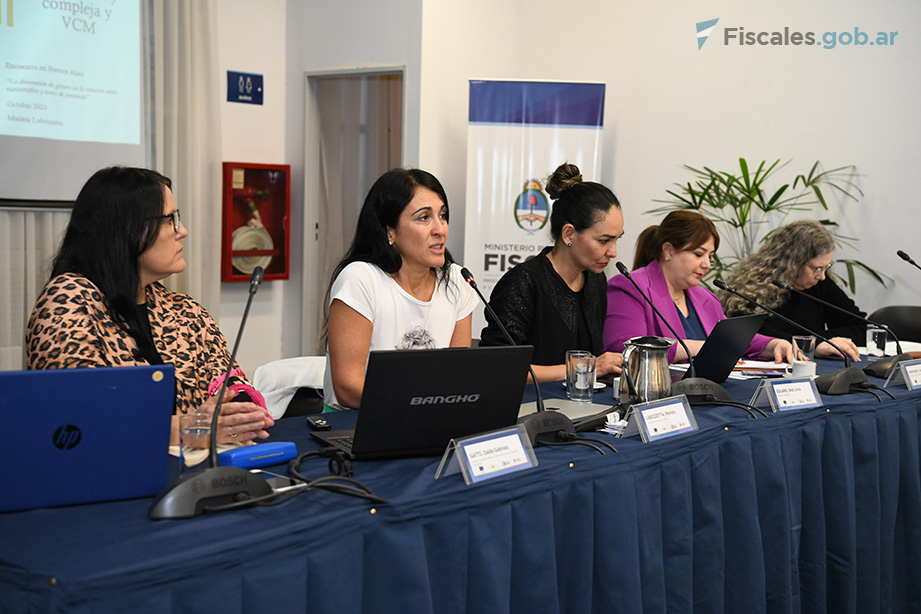Public prosecutors’ offices have a fundamental role to play in addressing violence against women. We interviewed Mariela Labozzetta, Head of the Specialized Prosecutor’s Unit on Violence against Women (UFEM) of the Public Prosecutor’s Office of Argentina.
In addition to these functions, she is also responsible for the AIAMP’s Gender Specialized Network (REG) with which we work from the COPOLAD III Program to generate new preventive approaches and criminal treatment for women and people from LGTBI+ groups used by drug traffickers in the production, transport or micro-trafficking of drugs, through their recruitment by human trafficking networks.
1) What are the main problems of violence faced by women in Latin America and the Caribbean?
Gender-based violence is a structural problem that crosses the entire social fabric, which is why it is expressed in all spheres and contexts in which community life unfolds. Advances in this area have made domestic or intra-family violence highly visible, coinciding with the space that has historically been reserved for women: the private space, in their roles as wives and mothers.
Femicides, as the most serious expression of violence against women, have different contexts, which reflects this absolute dimension of male violence: femicides are committed by partners or family members, but also femicides in the workplace.
2) How can the public administration provide solutions to these problems? What is the role of public prosecutors’ offices?
States, especially those that have committed themselves through international instruments, have the obligation to work towards the prevention, punishment and eradication of gender-based violence.
To this end, it is necessary for the public administration as a whole to develop public policies aimed at comprehensively addressing the problem. This implies the need to implement policies on prevention, assistance, protection and reparation of gender-based violence, to which must be added policies on equality and access to rights.
With regard to the justice system, the challenge is, in the first place, to put an end to impunity in cases involving violence against women, because impunity is a state message of “immunity“: when there is no sanction, the signal sent is one of acquiescence, of permissiveness, which contributes to the perpetuation of these patterns. In other words, working on the efficiency of investigations also means working on prevention and deterrence. In terms of criminal policy, it is essential that all criminal investigations and responses be carried out under strict due diligence, with a focus on gender, intersectional and respectful of human rights.
Secondly, we must work to generate responses in accordance with the needs of people who have experienced a situation of violence. In these cases, it is not enough to investigate effectively and impose sanctions. It is also necessary to address the needs of the victims.
Thus, the prosecutors’ offices have a very important role to play in terms of access to justice, protection and reparation for people who have suffered violence. Their investigations, we reiterate, must be developed with a gender approach, intersectional and respectful of human rights and their work cannot be thought of in isolation, it requires a coordinated, multi-agency work with other areas of public administration that can provide tools that allow effective investigations, avoiding impunity and ensuring women and LGBTI+ victims of violence a real and timely assistance, support, protection and reparation.
3) What new strategies can be applied in relation to the criminal treatment of women victims of trafficking involved in drug trafficking?
Regarding the situation of women involved in drug trafficking or organized crime, the challenge for judicial systems and public prosecutors is to raise the alarm to detect possible cases of trafficking or exploitation.
In these cases, women and LGBTI+ persons enter in the justice system as defendants. It is essential to train judicial operators to sharpen their gender perspective and detect whether the crimes for which they are accused came from a situation of exploitation or previous violence, whether these persons have been coerced in any way to act in this way, whether they are threatened, whether they were previously captured or whether there is any other type of exploitation of a situation of vulnerability.
For the development of the tasks of the Public Prosecutor’s Offices in this area, it is essential to work in coordination with other agencies, such as those responsible for the prevention and detection of acts related to organized crime, the existence of care and protection programs for victims and their families, and that the gender perspective and intersectional approach be applied from the beginning by all agencies involved. It is also essential that the areas specializing in drug trafficking, trafficking and gender-based violence address the issue jointly. Because criminal phenomena are no longer watertight compartments, but are becoming exponentially more complex and sophisticated and therefore require professional training in all areas.
In addition, drug trafficking and human trafficking are transnational criminal phenomena and international cooperation becomes necessary.
In this regard, AIAMP welcomes the event that the COPOLAD III Program organized in Buenos Aires a few weeks ago: “The gender dimension in the relationship between drug trafficking and trafficking in persons. Strengthening the capacities of the Public Prosecutor’s Offices for a comprehensive approach to the problem”, together with the Ibero-American Association of Public Prosecutors (AIAMP) . Now we are starting a path of joint work between the Network of Anti-Drug Prosecutors, the Network of Prosecutors Specialized in Trafficking in Persons and Smuggling of Migrants and the Specialized Network on Gender Issues (RFAI, REDTRAM, and REG) of AIAMP. This instance aims to achieve common criteria for action that generate working tools for prosecutors and other operators of the justice system, tending to address the problem with a gender perspective, intersectional, respectful of human rights, that dialogue with the rest of the agencies that have competence in the matter in each of the countries, allowing the development of effective investigations to confront organized crime.






